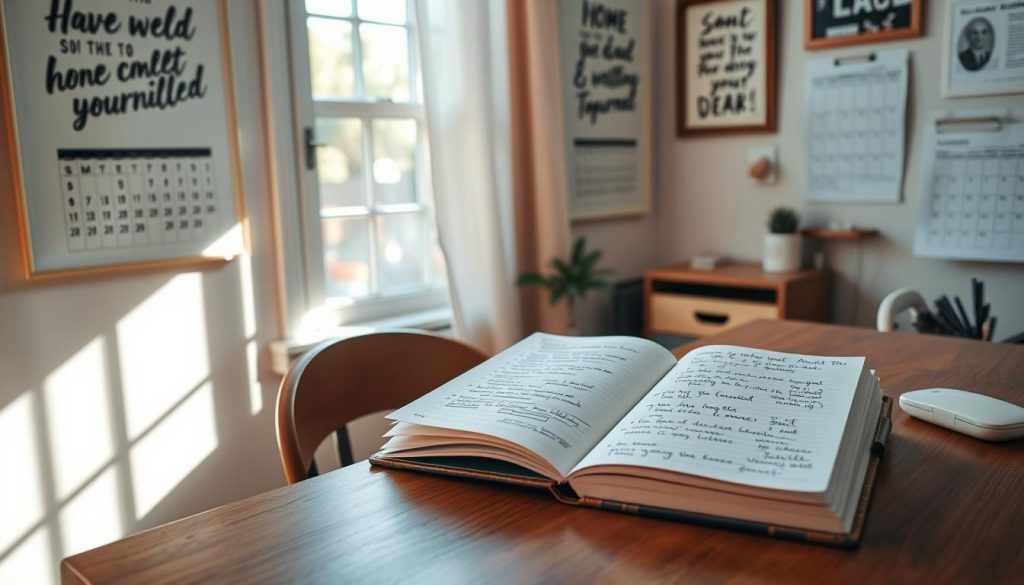Has your writing habit vanished? You’re not alone. Many people struggle to restart journaling after a long break. In fact, about 60% of individuals have experienced similar pauses in their journaling practice.
Life changes can disrupt our routines. Moving or switching jobs often throws us off track. Remember, journaling isn’t about perfection. It’s about reconnecting with yourself, one page at a time.
Psychotherapist Megan Rhoads suggests a simple approach. She recommends morning journaling to kickstart your practice. Create a gentle, judgment-free space to explore your thoughts.
Your journaling journey isn’t always smooth. Breaks can be short or long. The important thing is your willingness to start again. With the right mindset, you’ll rediscover writing’s therapeutic power.
Understanding the Benefits of Journaling
Journaling is a powerful tool for personal growth. It enhances mental wellness and promotes self-discovery. Your journal can unlock incredible potential for improving your well-being.
People of all ages can benefit from regular writing. Research shows the transformative power of journaling. It can lead to remarkable changes in one’s life.
Mental Health Improvements
Journaling serves as an emotional outlet. It can significantly reduce stress and anxiety. Studies show that brief writing sessions can lead to substantial mental health benefits.
- Reduces symptoms of depression
- Lowers blood pressure
- Improves emotional regulation
“Writing is a form of therapy; sometimes I wonder how all those who do not write, compose, or paint can manage to escape the madness, melancholia, the panic and fear which is inherent in a human situation.” – Graham Greene
Boosting Creativity
Your journal can unlock creative potential. Writing regularly helps organize thoughts and sparks innovative thinking. It provides a safe space for brainstorming ideas.
- Enhances problem-solving skills
- Develops unique perspectives
- Encourages free expression
Enhanced Self-Reflection
A consistent writing habit enables deeper self-understanding. By documenting experiences, you gain insights into personal patterns and emotions. You can also track your growth over time.
Research shows journaling leads to significant personal development. It improves relationships and strengthens appreciation for life’s possibilities. Writing about deep thoughts can transform your outlook.
Acknowledging Your Break
Taking a break from journaling is normal. It’s not a failure, but a chance for renewal. Understanding why you paused can help you return with fresh motivation.
Overcoming journaling breaks requires self-reflection. Research shows pauses are common, often lasting several weeks. Many people experience temporary stops in their practice.
Common Reasons for Journaling Breaks
- Feeling overwhelmed by daily responsibilities
- Losing initial journaling motivation
- Experiencing emotional burnout
- Lack of time or energy
Recognizing Your Emotional Journey
Your drive to journal naturally changes over time. Radical honesty suggests recording your feelings during the break. This can lead to deeper personal insights.
“A break is not a defeat, but a pause in your personal growth journey.” – Anonymous Journaler
Effective strategies for reengaging include:
- Acknowledging the hiatus without judgment
- Documenting major life events during your break
- Reflecting on personal growth
Understanding your break prepares you for a more meaningful journaling experience. It sets the stage for personal growth and self-discovery.
Setting Realistic Expectations
Restarting your writing habit can feel daunting. The key is to approach journaling with compassion. Many people struggle with rebuilding writing habits, often setting unrealistic goals.

Research shows brief daily journaling can boost mental well-being. Just 5-10 minutes a day can make a big difference. This small commitment can help maintain writing motivation.
Start Small and Be Kind to Yourself
When restarting your writing habit, try these gentle approaches:
- Commit to writing for just 2-3 minutes daily
- Choose a comfortable and inspiring writing space
- Use supportive language about your journaling journey
“Progress is not about perfection, but consistent small steps.”
Celebrate Your Progress
Rebuilding writing habits is a personal journey. Create a system to track and acknowledge your achievements:
| Milestone | Reward |
|---|---|
| First week of consistent journaling | Favorite treat or self-care activity |
| One month of regular writing | New journal or writing tool |
| Three months of maintaining habit | Special personal celebration |
Maintaining writing motivation is about embracing your unique path. Some days you’ll write brilliantly, others less so. That’s perfectly okay.
Choosing the Right Journal
The perfect journal can transform your creative writing and self-reflection. It’s a personal sanctuary for your thoughts, emotions, and experiences.

Digital vs. Paper: Weighing Your Options
Your journal choice impacts how you tackle writing challenges. Let’s compare digital and paper journals:
- Digital Journals
- Convenient and portable
- Easy to search and organize
- Password protection for privacy
- Paper Journals
- Tactile experience of writing
- No battery or technology required
- Can be more personally engaging
Finding Your Perfect Journaling Style
Budget and practicality are key in journal selection. Consider these insights:
- Budget-friendly options start at less than $1
- Ideal journal size varies by personal preference
- Smaller notebooks can enhance creativity
“The right journal can inspire you to write more consistently and meaningfully.” – Journaling Expert
Choose a journal you’ll enjoy using. Find something that motivates you to write regularly.
Making Your Choice
There’s no one-size-fits-all approach to journaling. Try different styles, sizes, and formats. Your journal should feel like a comfortable companion.
Creating a Comfortable Writing Space
Your journaling environment is key to building consistent writing habits. The right space can turn journaling from a chore into a cherished ritual. A good setup supports motivation recovery and enhances the overall experience.

An inviting journaling space focuses on personal comfort and inspiration. Studies show that 70% of people find a dedicated writing area improves their journaling experience. It’s not about perfection, but about what works for you.
Designing Your Ideal Journaling Sanctuary
Consider these key elements when crafting your writing space:
- Choose a location with minimal distractions
- Ensure adequate lighting (natural light increases inspiration by 30%)
- Select comfortable seating with good ergonomic support
- Keep essential writing tools within reach
Personalizing Your Environment
Your journaling space should reflect your unique personality. Personalization can increase the likelihood of maintaining a journaling habit by 40%.
| Environment Element | Potential Impact |
|---|---|
| Natural Light | Increases calmness by 30% |
| Calming Scents | Reduces anxiety by 20% |
| Personal Items | Boosts motivation and creativity |
“Your writing space is a sanctuary for your thoughts—make it inviting, comfortable, and uniquely yours.”
Consistency in journaling relies on a welcoming environment for your thoughts. Your space should support your emotional journey and writing habits. A cozy corner or minimalist desk can make a big difference.
Picking a Journaling Method
Choosing the right method can make your writing habit more enjoyable. Different approaches can help you overcome a writing break. They can also help you rediscover your creative spirit.

Let’s explore three popular journaling techniques. These can reignite your passion for writing:
Free Writing: Unleashing Creativity
Free writing is an excellent way to restart your journal. This method involves writing without stopping or judgment. It lets your thoughts flow naturally.
- Writing continuously without stopping
- Ignoring grammar and spelling
- Letting thoughts flow naturally
“Write without judgment. Your journal is a safe space for your thoughts.” – Julia Cameron
Prompt-Based Journaling: Inspiration on Demand
Prompts can provide structure and motivation when overcoming a writing break. They offer a starting point for your thoughts.
- Emotional check-in prompts
- Goal-tracking questions
- Creative writing triggers
Bullet Journaling: Structured Creativity
Bullet journaling offers a systematic approach to tracking thoughts and experiences. It’s perfect for those who love organization.
| Journaling Method | Best For | Time Investment |
|---|---|---|
| Free Writing | Emotional Release | 15-30 minutes |
| Prompt Journaling | Goal Setting | 10-20 minutes |
| Bullet Journaling | Organization | 20-45 minutes |
Remember, there’s no perfect journaling method. Experiment and find what resonates with you!
Establishing a Regular Routine
Consistent writing habits can transform your journaling journey. Building a sustainable routine kickstarts motivation recovery. Even a two-minute daily check-in can spark your journaling practice.

Finding the Right Time
Discovering your ideal journaling moment is key for consistency. Most people succeed with these time slots:
- Early morning (before starting the day)
- During lunch break
- Evening wind-down
- Right before bed
“Consistency is not about perfection, but persistent small efforts”
Making Journaling a Habit
Turn journaling into a natural part of your routine. Use these strategies to make it stick:
- Set a specific daily time
- Start with just 2-3 sentences
- Use digital reminders
- Link journaling to an existing habit
| Journaling Approach | Time Investment | Recommended Frequency |
|---|---|---|
| Morning Pages | 15-20 minutes | Daily |
| Quick Check-In | 2-3 minutes | Daily |
| Gratitude Journaling | 5-10 minutes | Daily/Weekly |
Remember, the goal is progress, not perfection. Your journaling routine should feel supportive, not restrictive.
Overcoming Writer’s Block
Writer’s block can feel like a huge obstacle for many journaling fans. Creative writing techniques can help break through these mental barriers. Understanding this common challenge is the first step to overcoming it.
These methods can spark your writing flow. They’ll help you rediscover your passion for journaling.
85% of people face writer’s block during their writing journey. This experience doesn’t mean you’re failing. It’s a natural part of being creative.
Techniques to Get Started
Try these self-reflection methods to kickstart your journaling:
- Stream-of-consciousness writing
- Using random writing prompts
- Creating quick list-based entries
- Setting a timer for uninterrupted writing
“Writing is not a matter of time, but a matter of space.” – Julia Cameron
Allowing Imperfection
Your journal is a personal space for expression. Embracing imperfection can free up your writing process. Let go of perfectionist tendencies.
50% of people returning to journaling struggle with self-criticism. Overcoming this can greatly improve your writing experience.
| Writing Block Challenge | Potential Solution |
|---|---|
| Perfectionism | Embrace rough drafts and spontaneous writing |
| Lack of Motivation | Use writing prompts and set small goals |
| Self-Criticism | Practice non-judgmental writing |
Remember, your journal is your space. No one else will read it unless you choose to share. Express yourself freely, without fear of judgment.
Staying Motivated
Keeping up with journaling can be tough. But there are powerful ways to maintain your diary habit. Your writing journey doesn’t have to be lonely.
Connecting with fellow writers can boost your motivation. Here are some ways to stay inspired:
Joining a Journaling Community
- Explore online forums dedicated to journaling
- Participate in local writing groups
- Follow journaling hashtags on social media platforms
Community support helps form habits. Cambridge University research shows regular writing improves well-being.
Using Journaling Challenges
- Try 30-day writing prompt challenges
- Experiment with gratitude journaling
- Track personal growth through structured writing exercises
“The magic of journaling lies not in perfection, but in consistent reflection.”
It takes three to eight weeks to form a new habit. Regular journaling challenges build momentum and joy in writing.
Try using colorful pens or digital platforms to make journaling fun. Your journal is a space for growth and self-discovery.
Revisiting Your Old Journals
Re-reading past journals can be a powerful self-reflection tool. It can transform your understanding of personal growth. Your writing becomes a time capsule of emotions, experiences, and evolution.
Creative writing techniques emerge when exploring archived journals. You might uncover forgotten dreams or track significant life changes. David Sedaris shows how careful archiving can reveal profound personal narratives.
Gaining Perspective
Many journal revisitors find clarity on past decisions. This reflective practice can boost your self-awareness significantly. Old journals serve as a personal roadmap of challenges and achievements.
Discovering Patterns and Themes
Look for recurring themes in your journals. They reveal your growth trajectory. Many experience increased self-compassion after reviewing their entries.
Journals are more than just records. They’re powerful tools for understanding your emotional landscape. They also help track your personal development over time.
FAQ
How do I restart my journaling practice after a long break?
Begin with a small commitment of a few minutes daily. Pick an exciting journal and create a cozy writing space. Be patient with yourself as you restart your practice.
Remember, there’s no “right” way to journal. Taking a break doesn’t mean you’ve failed.
What are the benefits of journaling?
Journaling reduces stress, improves mental health, and boosts creativity. It enhances self-awareness and provides a safe space for emotional expression.
It helps track personal growth and serves as a powerful tool for problem-solving. Journaling also promotes self-reflection and understanding.
I struggle with writer’s block. How can I overcome it?
Use writing prompts or try stream-of-consciousness writing. Start with simple lists or practice free writing to break through creative barriers.
Your journal is a judgment-free zone. Don’t aim for perfection, just focus on getting your thoughts down.
Digital or paper journal – which is better?
Digital journals offer convenience, searchability, and privacy. Paper journals provide a tactile experience and can feel more personal.
Choose the medium that feels most comfortable and motivating for you. You can even use both depending on your mood.
How often should I journal?
Consistency matters more than frequency. Start with a realistic goal, like writing 2-3 times a week.
Aim for 5-10 minutes a day. Make journaling a sustainable habit that fits your lifestyle without feeling like a chore.
What if I don’t know what to write about?
Use journaling prompts or write about your day. Express your feelings or list things you’re grateful for.
Explore your goals and dreams. Document interesting thoughts or reflect on recent experiences. Write whatever comes to mind without judgment.
How can I stay motivated to continue journaling?
Join journaling communities and participate in writing challenges. Set achievable goals and reflect on the benefits you’re experiencing.
Create a comfortable writing environment. Experiment with different journaling styles. Be kind to yourself if you miss a few days.
Is it worth keeping old journals?
Yes! Old journals are valuable records of your personal growth. They provide insights into your past thoughts, experiences, and emotions.
Revisiting them helps recognize patterns and celebrate progress. They offer a deeper understanding of yourself over time.
Source Links
- Getting Back to Journaling After a Pause – Thrive Global
- Overcoming a Journaling Rut
- How Journaling Can Help You in Hard Times
- The Benefits of Journaling in the Morning (or Evening)
- The Healing Benefits of Journaling – Mind & Spirit Counseling Center
- How To Write In Your Journal To Improve Yourself and Achieve Your Goals
- Day One Tip: Overcoming Lapses in Journaling
- Overcoming Barriers to Journaling: A Guide to Starting and Sustaining a Journaling Practice — Sage Holistic Counseling PLLC
- How to Find Your Perfect Journaling Routine – Baronfig
- Pick Your Perfect Journal
- The Right and Wrong Way to Journal
- How to Start (or Restart) Your Journaling Practice – Becoming Who You Are
- How to Establish a Journal Routine That You’ll *Actually* Stick To — erin resteiner
- Creating an Inspiring Journaling Space
- How to Create an Inspiring and Cozy Space for Journaling
- Journaling Techniques to Help You Start a Journaling Practice – Beth Foreman
- Choose a Journaling System That Works For You — WRITING MINDSET
- 5 Tips To Make Journaling A Part Of Your Daily Routine – Discovery Village Deerwood
- How to Start a Consistent Journaling Practice for Self Care – Headstands and Heels
- How to Overcome Writer’s Block Once and For All
- Overcoming Writer’s Block For Daily Journaling
- Journal Writing: How to Start Journaling and Stick to It
- How to Motivate Yourself to Keep a Journal
- The importance of re-reading notebooks – Austin Kleon
- Why You Should Revisit Your Old Journals
- Why You Should Revisit Your Journal Archives

